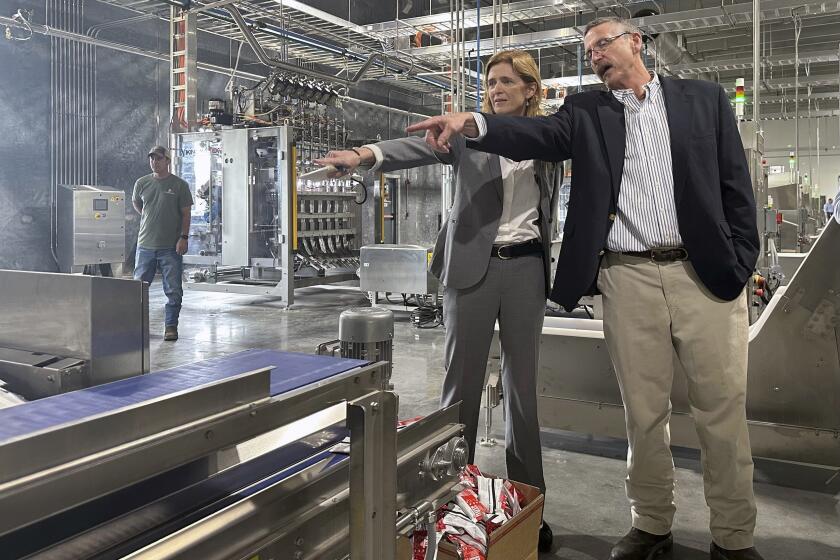Brutal details of New York Mafia life recalled in ‘Goodfellas’ heist trial
The man in the black track suit spoke in a voice as deep and gravelly as the pits where the bodies were buried.
He recounted a life of crime, from small-time hustling for neighborhood mobsters to the big stuff: hijackings, murders, beatings and drug trafficking.
From the witness stand in a Brooklyn courtroom, Peter “Bud” Zuccaro was at ease recalling the brutal details, like the time someone raised a hand to Fat Andy’s wife and was never seen again, or the time he blew off the head of an attack dog chewing on his arm.
NEWSLETTER: Get the day’s top headlines from Times Editor Davan Maharaj >>
If it sounds like a Hollywood movie, that’s because it is: Martin Scorsese’s 1990 “Goodfellas,” which told the story of the 1978 Lufthansa heist and its bloody aftermath. Nearly 40 years later, Vincent Asaro is on trial on charges that he helped plan the robbery, which netted a record $6 million in cash and jewelry, and that he was a heavy in the Bonanno organized crime family when it held sway on the mob-infested streets of Queens and Brooklyn.
When they unsealed the indictment against Asaro last year, federal prosecutors described him as a onetime Bonanno family captain who used his power to extort money, to stage major heists and to kill those who crossed him, including a man strangled with a dog collar for being a suspected snitch.
Asaro, who has pleaded not guilty, could spend the rest of his life in prison if convicted.
The Lufthansa heist at John F. Kennedy International Airport was the “score of scores,” assistant U.S. Atty. Lindsay Gerdes said in her opening statements on Oct. 19, describing Asaro as a “gangster through and through” who lived for money, power and the Mafia.
But times have changed for the old-time capos, captains, skippers and soldiers of the Cosa Nostra, who in Asaro’s trial have come across more as whiny old men than wiseguys, griping on secret recordings about gambling debts and the lack of respect from the younger generation.
“I lost my son when I made him a skipper,” Asaro, now 80, was heard grousing on a 2012 recording, referring to his son Jerry’s promotion in the mob. In an obscenity-laced rant, Asaro went on to disparage his son, now in prison, as greedy, lazy and nowhere near the tough guy that his dad is.
“I feel like killing everybody,” Asaro, in a particularly bad mood, snarled at one point on another 2012 recording.
As the recordings played in the courtroom, Asaro sat at the defense table looking more professorial than predatory in a gray V-neck sweater, button-down shirt, glasses and combed-back gray hair. But signs of temper flared as witnesses testified for the prosecution.
They included Asaro’s cousin, Gaspare Valenti, who started wearing a wire in November 2008 after gambling away his take of the Lufthansa loot and other illegally acquired funds. Destitute, the 68-year-old Valenti testified that he struck a deal with the FBI to become an informant for $3,000 a month.
During Valenti’s testimony, Asaro furiously scribbled notes on yellow Post-its and handed them to members of his defense team. He whispered loudly to his lawyers and at one point shook his head back and forth and mouthed “not true.”
Asaro appeared so enraged that Judge Allyne R. Ross later warned him that his demeanor could affect the jury. “It’s not in your best interest to draw attention to yourself,” she said after jurors had been dismissed for the day.
Valenti violated the Cosa Nostra’s code of silence and loyalty. So did Zuccaro, now 60, who began cooperating with the FBI five years before Valenti.
Both men’s reasons for turning underscored the hardships of life in organized crime, where one misstep can turn a man into a pariah with a target on his back.
Zuccaro, who was associated first with the Bonanno family and later the Gambinos, described planning his first hit. He didn’t know the man, who was ordered killed after calling a Bonanno family member a cornuto, or cuckold.
“It’s probably one of the worst insults you can call an Italian — an Italian man, anyway,” Zuccaro said. He “clocked” the target — studying his schedule and figuring out when he would come home — and then watched from across the street as another gangster shot him dead outside his house.
His victims weren’t limited to human beings. Zuccaro testified that he once shot dead an attack dog that turned on him when he entered his Queens auto repair shop, in which Asaro also had a business interest. Zuccaro was in disguise after having just committed a robbery and said he suspected the dog did not recognize him.
Later that night, Zuccaro testified that Asaro showed up at his home with some fellow thugs, enraged over the dog’s death and insisting that it was not Zuccaro’s dog to kill.
“I paid for half the dog,” said Zuccaro, who testified that he turned to his boss in the Bonanno family to settle the dispute.
Valenti and Zuccaro testified that over the years, they gambled away whatever money they had collected from hijackings, drugs, extortion and other crooked activities. Both admitted to a litany of crimes.
Asaro’s defense attorneys say their client is being framed by turncoats who hope to get leniency in exchange for their cooperation with prosecutors.
Valenti and Zuccaro insisted that wasn’t their chief reason for testifying. Rather, they said, they were tired after decades of crime — so tired that Zuccaro wasn’t interested when the Gambino family invited him into its fold 15 years ago.
“A lot of years of watching what was going on, a lot of years of ups and downs,” Zuccaro said. “I didn’t need it.”
Not long after that, facing a possible 20 years in prison on drug charges, he broke the first rule of the mob and became an informant.
“Loyalty is A Number 1,” he said. “The family comes first, before your own family.”
Asked about the other rules, Zuccaro said: “You gotta be a good earner. And a killer.”
Zuccaro said he was both.
Twitter: @tinasusman
ALSO
How evolving public attitudes on marijuana could affect the 2016 presidential race
Nondiscrimination ordinance puts Houston at the center of latest gay rights battle
Should U.S. tolerate foreign dictators? Issue splits Republican candidates
More to Read
Start your day right
Sign up for Essential California for news, features and recommendations from the L.A. Times and beyond in your inbox six days a week.
You may occasionally receive promotional content from the Los Angeles Times.







